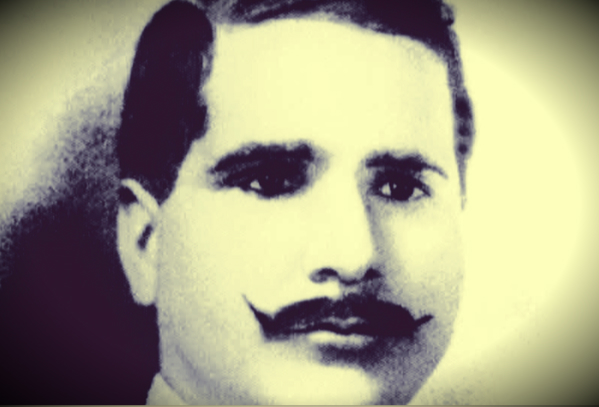Shahir-e-Mashriq – Allama Sir Muhammad Iqbal
by Prof. M.S Baqa
Allama Muhammad Iqbal is known as the most eminent poet and philosopher of the east. He was endowed with a natural gift of poetry and radical thinking. Poetry came to him as leaves to a tree, with his poetical faculties becoming an effective vehicle for his lofty thoughts. Iqbal wrote a number of works mainly in Persian and Urdu.
He said of poetry that: “If the basic purpose of poetry is the making of mankind, then it can inherit the qualities of prophethood.”
Iqbal is the most widely acclaimed modern Urdu poet and philosopher of the subcontinent and one of the few whose works have been translated into almost every major language of the world.
Iqbal was born in the Punjabi town of Sialkot, which is situated to the north-east of Lahore on the borders of Kashmir. Although his family claimed Kashmiri descent, his own language was Punjabi. He was educated in Urdu and Persian and like all members of the Indian middle class of his time had an early grounding in English, the language he later used for his complex philosophical prosework.
In his student days at Lahore, Iqbal had already established his reputation as a poet and would declaim his verse before large, appreciative audiences. At first, writing very much under the influence of the late nineteenth-century poets and especially Hali, he directed his attention towards nationalistic, pan-Indian themes and won instant acclaim for poems like Himalaya.
One of his earlier poems, which was written for children and therefore simply, almost naively, expressed, was the Tarana -e Hind (“the Indian Anthem”). For a long time this poem remained part of the school curriculum and is still remembered by those who belonged to his generation.
“In the entire world our India is the best
We are its songbirds, there we build our nests.
We may be poor, in exile, torn apart,
But in our Indian homeland lives our heart.
Religion does not counsel enmity
As Indians we strive for unity.”
In his poetry, written before he left for England, he was still at an experimental stage, there being distinct echoes of English romantics and Persian mystics in it. Partially derivative as some of these poems are, they are not without a clear foreshadowing of his later philosophy.
“This life, this existence is for you
As I sit daydreaming, each day is déjà vu
Why is it I love you so, O my dear beloved
Don’t think me a mere poet – For I am a lover
My words of pain and grief more profound than you know
For I long for the beloved’s companion
Come make this heart your own
For it is already yours by name.
In this languishing state I quiver
O Lord please I beseech Thee to deliver”
Most of his early poems were published in the Makhzan, a popular monthly. A still more effective outlet for his poetic energy was provided by the Anjuman-e-Himayat-e-Islam whose annual meetings at Lahore attracted large Muslim gatherings.
He received honours in philosophy. After some tentative work as a lecturer at Government College, Lahore, Iqbal left for Europe for higher studies in philosophy and law (1905).
In 1905, Iqbal was noticed by the British Orientialist, Sir Thomas Arnold, who advised him to pursue higher studies in philosophy at Cambridge. There he worked for some time with the neo-Hegelian McTaggart and in 1907 submitted his thesis on “The Development of Metaphysics in Persia” to the University of Munich. It was during this time that he underwent a noticeable spiritual change. In Europe he had the opportunity to meet and converse with some of the most eminent philosophers of the day.
Iqbal had an unshakable belief in the unity of mankind. In spite of our racial, linguistic, religious, and national differences human beings shared a common bond. This is why he considered mankind as the very touchstone of all human activity.
‘’What is humanity? It is to show respect to human beings, become acquainted with the high position of mankind.”
He is noted as a great champion of the oppressed and poor. In his view Capitalism, Imperialism, or Communism could not completely solve all moral, social, political and economic problems. His well balanced and cosmopolitan outlook helped him to see everything in its entirety.
“Rise up and awaken the poor people from their slumber
Shake the walls and doors of rich men’s palaces
O God, when will the ship of Capitalism be wrecked? Thy world is awaiting the day of reckoning
Thousands of God’s worshippers wander about in jungles.
For I will obey the lover of God’s creatures”
On his return to India, seeing the plight of Indian Muslims, Iqbal began to see Islam as the central guiding force for the Muslims of undivided India. It must be remembered however that Iqbal remained a Muslim modernist.
In a speech in 1930, Iqbal called the Muslims of then undivided India to demand a separate homeland. His thinking was to safeguard their political, economic, cultural and religious rights. In this way he played a leading role in conceiving the dream of Pakistan.
Iqbal passed away on the 21st April 1938. Although he passed away nine years before partition, he is regarded in Pakistan as the spiritual father of the country.
Excerpt of a letter from Allama Iqbal to Quaid-e-Azam in 1937: “For Islam the acceptance of social democracy in some suitable form and consistent with the legal principles of Islam is not a revolution but a return to the original purity of Islam.
The modern problems therefore are far easier to solve for the Muslims than for the Hindus. But, as I have said above, in order to make it possible for Muslim India to solve the problems it is necessary to redistribute the country and to provide one or more Muslim states with absolute majorities. Don’t you think that the time for such a demand has already arrived?”
The author is widely recognised as the living authority on Iqbal has lectured and written on Iqbal for more that 50 years.


